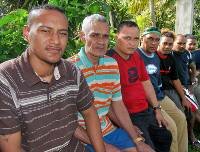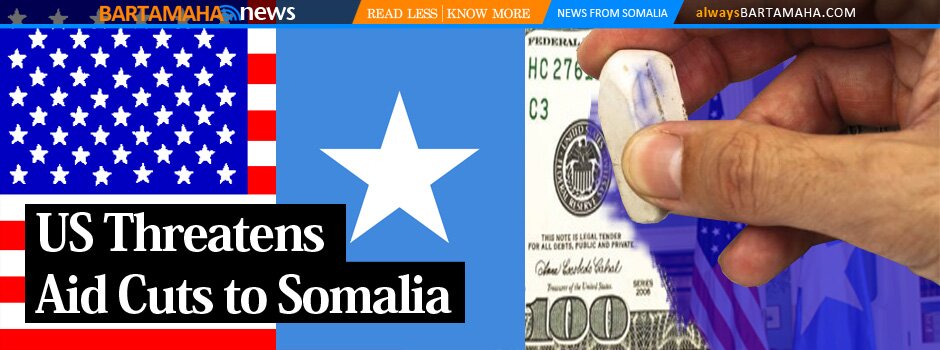The day we met terror
 AFTER serving a breakfast of eggs and bacon, Olataga Safoka started on his next chore – lunch for the 24 crew members of the MV Hansa Stavanger.
AFTER serving a breakfast of eggs and bacon, Olataga Safoka started on his next chore – lunch for the 24 crew members of the MV Hansa Stavanger.
It was just like any morning but this April 4 was going to be different.
Smoking a cigarette with a Kiribas band playing in the background, Safoka stared out into space as he prepared to recount his 122 days as a hostage.
“It’s good to be home,” he said. “It is so good to be home.
He was not really home as home was Tuvalu. But for someone who was holed up as a captive on a ship thousands of kilometres from his island, I understood what he meant.
“On April 4, at 9.05am the ship’s pirate alarm or signal went off. I thought it was a joke, or just an exercise.
“We all went up to a room but the chief engineer later told us to go down to the engine room as it was unsafe to be where we were.
“Of course, we were all terrified. About 9.50am, there was a loud explosion and the boat shook, we knew something had happened. There were shots fired and at 10.15am the pirates took over the boat,” the 56-year-old recalled.
Every crew member was summoned to the bridge of the ship and told to put their hands behind their hands and lie face down.
Two pirates stood over them, looking menacingly with their guns.
Part of the ship was on fire and the captain pleaded with the pirates to allow the crew to put it out.
“They agreed so we put out the fire with the two men standing and watching us with guns.
“It took us four hours to fight the fire. After that, we were summoned to the bridge again.
“They asked for our money, mobile phones, watches and took them away.
“We had been drifting for about three hours. The ship was 150miles from the Somali shore when it was taken.
“The pirates asked the captain to start the engine again and go to Somalia, near Parawa, where the commander of the pirates boarded the ship with 20 other Somalis.
“They asked for everything we owned and took whatever they wanted. They stripped our beds of bed sheets and clothes.”
Being the chief cook, Olataga had the tough duty of budgeting their food.
“There’s 24 of us and I prepared three meals a day. After the first three weeks, we ran out of eggs. They threw out all the pork meat on the day they came on board because it was against their religion. By the first week of July, there was no more meat and water.
“We drank the water for the air-conditioning systems and we fished for our meals.”
At times, Olataga and the steward would not eat as the pirates ate with them.
“They would cook their own meat but would come to us whenever our meals were ready.”
On May 26, Olataga was locked up with the Russian and German crew members as the pirates escalated their demands for ransom. “They told the ship owners that we had been taken inland but we were locked in a room for one month and 14 days.”
This was a time that the crew members were most frightened. They were blindfolded and threatened. The pirates would check them at 15-minute intervals.
Jack Taleka, an able seaman on the ship, said they were reminded by their captain to keep their emotions intact when they contemplated taking down the pirates.
“Don’t try to be a hero, the captain often reminded us. But, of course, there were times when emotions ran high and we were almost fighting amongst ourselves.
“We were just like one big family – the Russians, Germans, Tuvaluans and the Fijians. The captain reminded us that the German navy was going to rescue us. And we thank the German frigate, F209, that was always close by. We could see it on our radar watching us the whole time we were in captivity. It gave us hope in those days,” Taleka said.
One meat that the sailors absolutely detested after the experience is goat meat. Ordinary seaman Malologa Bruce was known as the “goat killer”, having to do it for the pirates. “Once it was dead, they would just put the meat in without washing or whatsoever in the pot as soup, even the waste, and we were told to eat that too,” Olataga says.
“Those people (Somalis) were just animals. They manhandled us and laughed when we told them we were not used to people holding guns to our head. They said they were used to and even small children were taught how to use guns, without guns they can’t survive. These pirates did not know how to use the toilets and our engineers had to clean and clear the toilets 10 times a day because of blockage.”
On August 3, freedom finally beckoned but the seafarers didn’t want to get their hopes high until after they were out of Somali waters.
At about 1.30pm, they were lined up on the deck as helicopters owned by the ship owners circled the ship to see if all crew were present.
Once, twice as they counted the crews and then they “practiced” the dropping of the money on to a small boat waiting nearby. The first attempt was successful and so the second was the dropping of the $2.75million itself.
“It took them only half an hour to count the money and distribute it,” Olataga said.
The ship’s engine was already warming up and they were soon allowed to go. Five pirates stayed on board to make sure the boat with the money reached its destination.
When that happened, the Hansa Stanavanger finally sailed for Kenya with the German navy escorting it.
From Kenya, the crew members parted for home.
For the Tuvaluans, some who have been away for more than a year, the trip home may not happen until August 27 when seats are available on Pacific Sun. Efforts are being made for a charter flight. The crew members do not want to go by boat just yet.
“We still have flashbacks and at the moment it is our family that matters, they have been through a lot, they will decide whether we will sail again,” said Taleka.
Source: Fiji Times
By ELENOA BASELALA
Photo: We survived Somalia … Tuvaluan sailors recall their 122 days at the mercy of Somali pirates
Comments
comments
 Calendar
Calendar






































